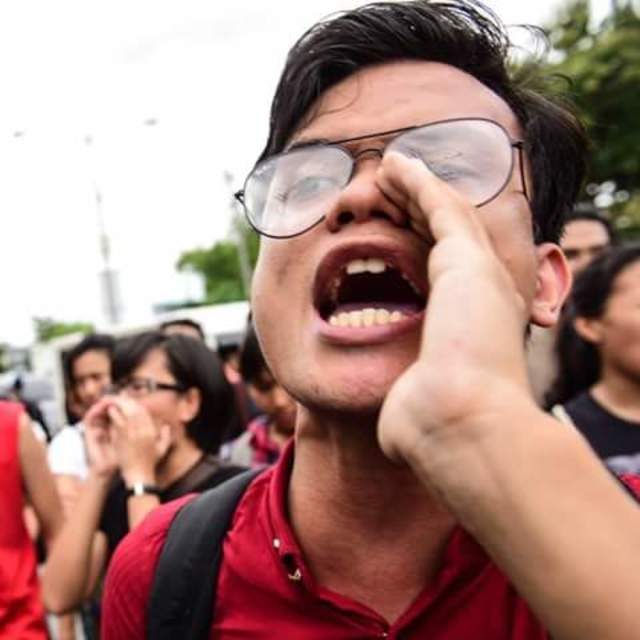SUMMARY
This is AI generated summarization, which may have errors. For context, always refer to the full article.
![[OPINION] Debates, discourse, and dissonance: Politics as a spectator sport](https://www.rappler.com/tachyon/r3-assets/612F469A6EA84F6BAE882D2B94A4B421/img/410C32152A504B05B8061ED4EAFB07DA/debates-discourse-dissonance-20190405.jpg)

Aristotle once divided citizens into two camps: the polites, citizens concerned with public affairs; and the idiotes, people who were only preoccupied with their own private matters. Today, these terms roughly translate to the words “politician” and “idiot.” As difficult it is to believe today, they used to mean opposite things.
Presently, it feels like it should be more and more difficult to become an idiot. After all, through the internet and social media, getting information about politics – as well as expressing political thoughts and opinions – has never been easier.
But as it takes more effort to validate a news source’s credibility than to share and talk about it, most of our political “activity” as citizens involves talking politics rather than learning about it. (READ: [OPINYON]: Edukasyon at pagsasakapangyarihan ng mga botante)
Unfortunately, rather than helping us become more caring individuals, many of us tend to become private individuals who only happen to talk politics from time to time.
This is not new, as many of us have always lumped together politics, basketball, and showbiz as topics of conversation which go in and out of fashion, and are ultimately inconsequential.
But unlike basketball and showbiz, our opinions in politics cannot be merely shrugged off as a matter of uninformed, unreasonable preference.
Our opinions shape our action, as well as our inaction. Thus, if we treat our political beliefs and preferences as “important but not that important,” they just might be.
An interesting and fruitful discussion must be had about what it means to become truly “politically active” in a society where it is easy to fake it. However, it is also important to see what such a societal disposition costs and who profits from it.
The reason politics is becoming more and more a spectator sport is that there are people benefiting from the division and chaos caused by uninformed opinions, blatant lies, and fear and antipathy among groups of people.
Consider the event being promoted in social media as Politicon Philippines. The idea is that it would be “an afternoon of debates, discourse, and dissonance with some of the greatest leaders in Philippine politics,” marketed with the tagline: “Making Politics Cool Again.”
If the unapologetic celebration of “dissonance” as a feature of the event – or the marketing of the guests as “the greatest leaders in Philippine politics” without naming any of them – did not sway you to come to this event, maybe the P1,000 VIP entrance and after-party at the Penthouse by the Bay might change your mind.
The event is teeming with elements symbolic of how Philippine politics has more to do with spectacle than it has with problem-solving.
The poster shows “political figures” Sass Sasot and Richard Heydarian as headliners. To those who follow them, these two might be easily marketed as “political adversaries,” having expressed opposing views a number of times. Thus, their “confrontation” in the event might seem to be the boxing event of the century. But for the rest of us, their “clash” will mean as much as it means when they clash in social media: nothing.
Surely, it will mean something for the Marawi soldiers, who will receive “100% of the proceeds from the event.” However, it seems to be out of a twisted sense of humor that “debates, discourse, and dissonance” in this publicity event will be used to help the soldiers and their families: people who would have benefited from “debates, discourse, and dissonance” from Congress and the administration when they were supposedly deliberating the merits of continued martial law and militarization in the area.
In sum, Politicon is a caricature of the cottage industry that has popped up since misinformation and divisive rhetoric became valuable commodities in social and traditional media. While it means nothing to us, it helps build the career and clout of so-called “public infuencers.”
If politics has devolved into a spectator sport, then public influencers are its superstars. It takes a particular skill to be a public influencer: positioning yourself strategically during moments which will probably gain a large amount of attention from the public; barraging your fanbase and target audience with pandering; and provoking hostility, confusion, and reactions from those who don’t know you or hate you.
Once a public influencer has enough clout, he or she can leverage it for more popularity through mainstream news and media, or worse, a Cabinet position or a congressional bid.
Public influencers, whether they purport to be “just an ordinary, outspoken citizen” or a “public intellectual,” have found a way around the distinction between the polites and the idiotes by making a career out of talking about politics.
The worst part about this phenomenon is that the actual people whom we pay to engage in “debates, discourse, and dissonance” use the public’s obsession with political spectacle around issues to hide their backroom dealings and vested interests.
Why talk extrajudicial killings or the Sagay massacre, when we can talk of Jim Paredes’ sex scandal? Why should a senator engage his constituents’ support for Ferdinand Marcos’ hero’s burial or the Tax Reform for Acceleration and Inclusion law if Mocha Uson’s already defending everyone?
Spectacle eats at the heart of our democracy. It gives those who are in power a means to divert attention from them, and gives power to those diverting our attention. (READ: [OPINION] The revolutions Filipinos must uphold)
It’s election time. If there’s anyone who should engage in “debates, discourse, and dissonance,” it’s the candidates. – Rappler.com
Vin Buenaagua is a youth advocate for ecological and economic justice. He is a graduate of BA Political Science from the University of the Philippines and a member of Sanlakas as well as the Power for People Coalition.
Add a comment
How does this make you feel?
There are no comments yet. Add your comment to start the conversation.